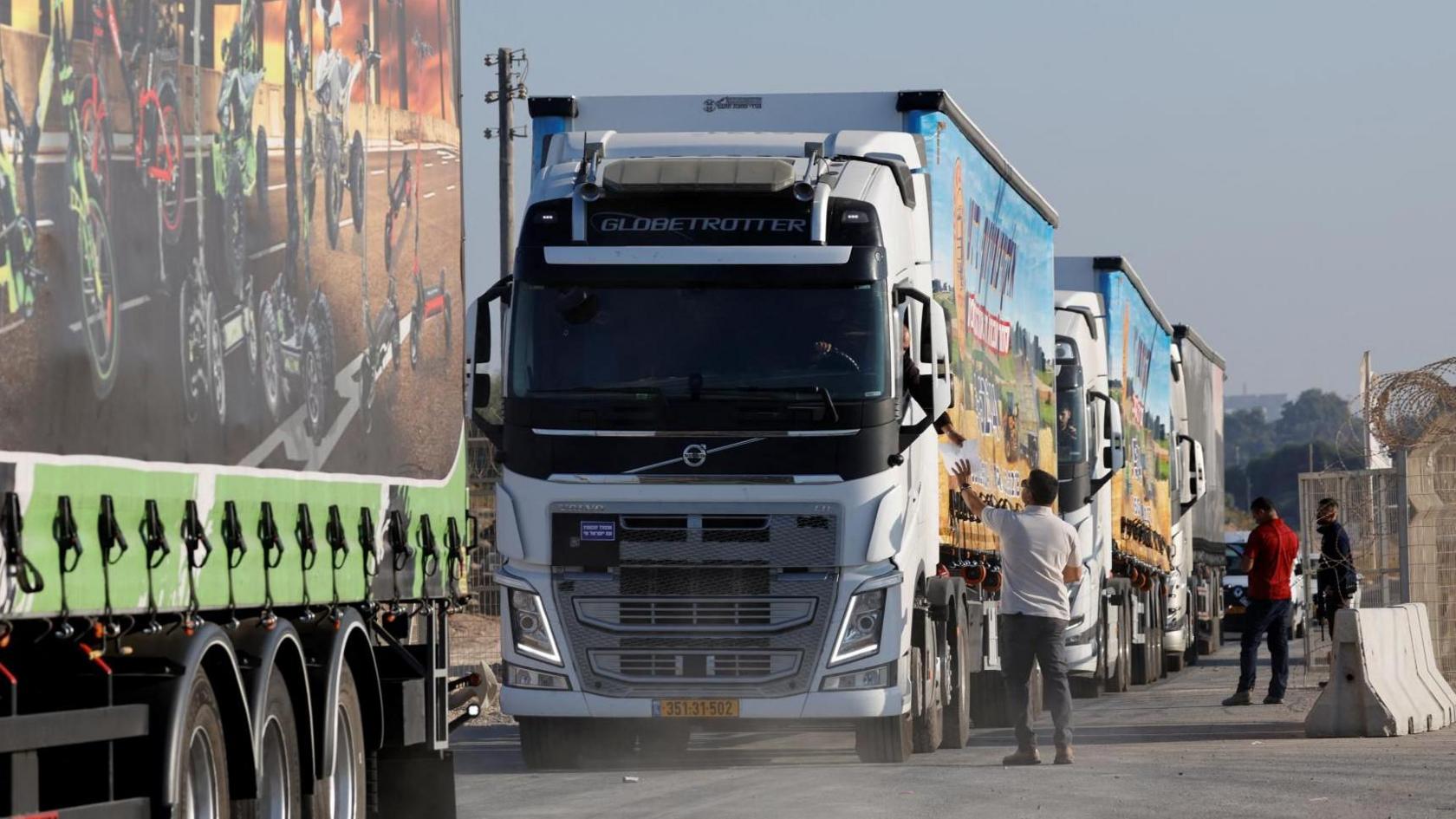UN suspends aid deliveries through main Gaza crossing

- Published
The biggest UN agency providing aid to Palestinians has said it is suspending deliveries through the main crossing between Israel and Gaza because of security concerns.
The head of Unrwa, Philippe Lazzarini, said two recent convoys had been looted by armed gangs near the Kerem Shalom crossing and called on Israel to maintain law and order.
Israel has previously said that it facilitates the passage of aid into Gaza and accused Hamas of hijacking and stealing deliveries.
Kerem Shalom is the main route for delivering aid to the more than two million people in Gaza, which the UN has warned is on the brink of famine.
Recent weeks have seen a series of increasingly violent thefts by criminal gangs, which aid workers have said are now the main obstacle to the distribution of supplies.
On 16 November, a convoy of 109 lorries carrying food was attacked by masked men who held the drivers at gunpoint before stealing 97 of the lorries.
A notorious Gazan criminal family later blocked the main road leading away from Kerem Shalom for two days, erecting iron barriers and reportedly firing on lorries trying to access an aid distribution point.
Aid workers and locals have also alleged that armed men operate within plain sight of the Israel Defense Forces (IDF) in a restricted zone at the Israel-Gaza border.
Announcing the pause in deliveries, Mr Lazzarini said the road away from the crossing "has not been safe for months", citing the theft of five more lorries on Saturday as well as the incident last month.
The announcement also followed the death of three people employed by World Central Kitchen (WCK), a food charity, and two others in an Israeli strike on Saturday.
Israel said the target of the strike was a WCK employee who had taken part in the 7 October attacks.
"The delivery of humanitarian aid must never be dangerous or turn into an ordeal," Mr Lazzarini said.
He said there had been a "breakdown of law and order" and that the responsibility to protect aid workers lay with Israel.
"They must ensure aid flows into Gaza safely and must refrain from attacks on humanitarian workers," he said.
Israel has in recent months opened a number of other crossings into central and northern Gaza following international pressure to increase the flow of aid, but Kerem Shalom remains the one through which most aid enters Gaza.
Food charity pauses Gaza work after staff killed in Israeli strike
- Published30 November 2024
US to start immediately on fresh push for Gaza ceasefire
- Published28 November 2024
Israel building new military dividing line across Gaza, satellite images suggest
- Published28 November 2024
Speaking at the UN in September, Israeli Prime Minister Benjamin Netanyahu insisted his government was allowing the equivalent of "more than 3,000 calories a day for every man, woman, and child" into Gaza.
He accused Hamas of stealing aid deliveries and selling food at exorbitant prices as a means of maintaining control in the strip.
Responding to Unrwa's announcement, the Coordinator of Government Activities in the Territories, which oversees the Israeli government's civilian policy in Gaza, said there were other humanitarian organisations delivering aid.
"We will continue to work with the international community to increase the amount of aid making its way into Gaza, through the Kerem Shalom Crossing as well as the other four crossings between Israel and Gaza," it said.
Last month, a review by the Integrated Food Security Phase Classification, external - which is run by the UN and a group of international charities - said the number of aid shipments crossing into Gaza was lower than at any time since the current conflict began in October 2023.
It warned that the "humanitarian situation in the Gaza Strip [was] extremely grave and rapidly deteriorating", adding that, under a "reasonable worst-case scenario, a risk of famine existed for the whole of the Gaza Strip".
The review said "immediate action [was] required from all actors who are directly taking part in the conflict, or have influence on its conduct, to avert and alleviate this catastrophic situation".